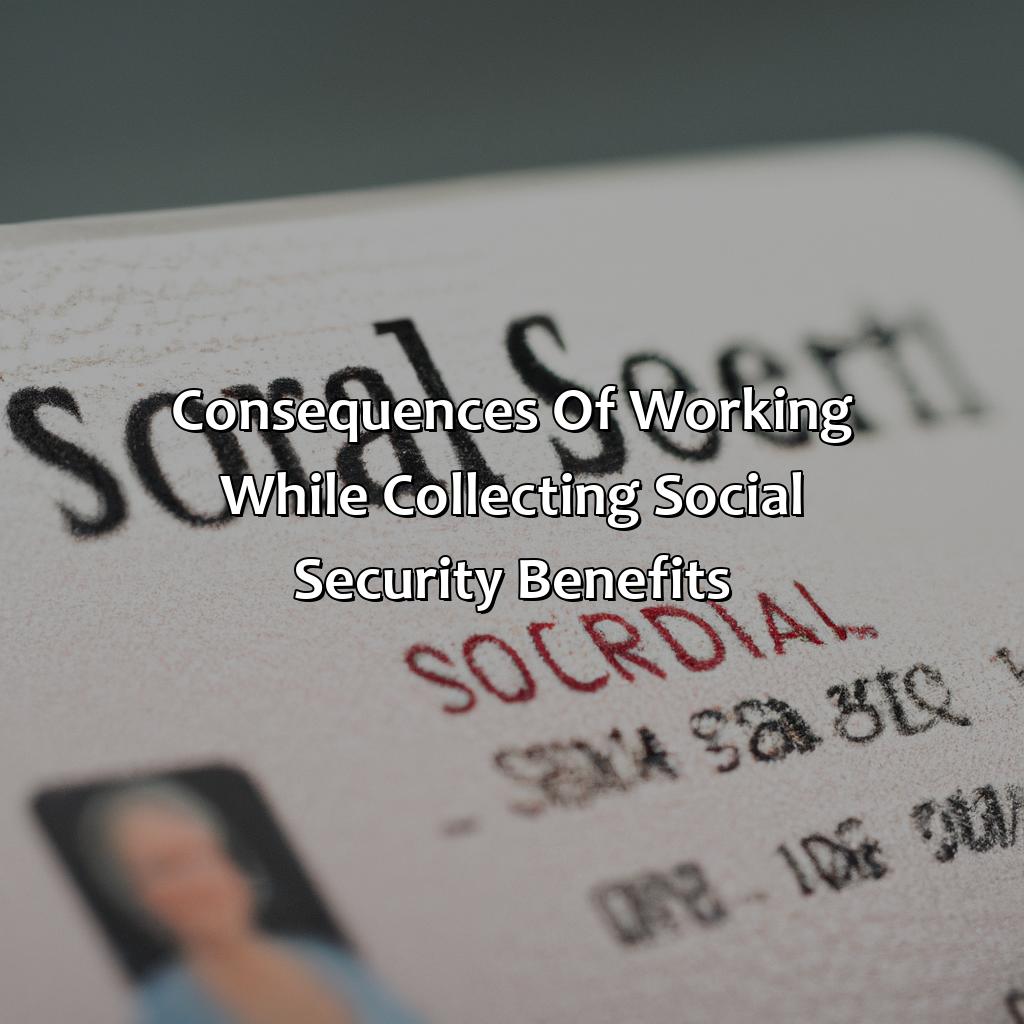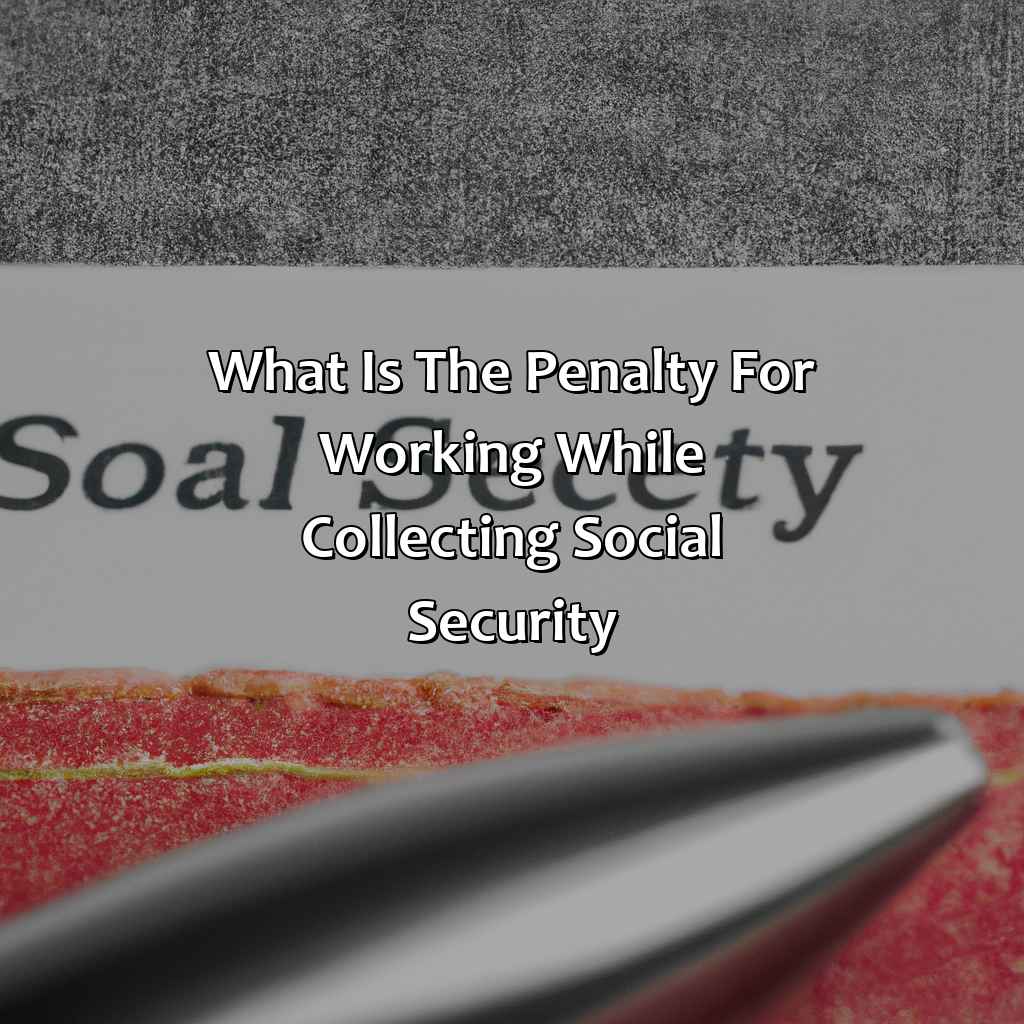What Is The Penalty For Working While Collecting Social Security?
Key takeaways:
- There are basic rules and eligibility requirements for working while collecting Social Security benefits. These include earnings limits and income thresholds that must be met.
- Working while collecting Social Security benefits can result in reduced benefits, tax implications, and overpayment and penalties. It is important to understand these consequences before making the decision to work.
- Exceptions and special rules apply to those who reach full retirement age, disability recipients, and those who qualify for work incentives. Understanding these rules can help individuals make informed decisions about working while collecting Social Security benefits.
Are you a senior who relies on Social Security? Do you worry about the repercussions of working while collecting benefits? Find out the penalty for working while collecting Social Security here. You need to know this to make sure your hard work doesn’t affect your benefits.
Social Security Benefits and Working
Want to know how you can keep working but still collect Social Security? Check out the section “Social Security Benefits and Working”. It has sub-sections with answers. You’ll discover the rules, eligibilities, limits and thresholds. Use this info to make wise decisions about income and retirement.

Image credits: retiregenz.com by David Jones
The Basic Rules
When collecting Social Security benefits, you can work, but there are rules to follow. If you work and have not yet reached your full retirement age, your benefits may be reduced based on your earnings. The amount of reduction depends on how much you earn above the annual limit.
For this year, the annual earnings limit is $18,960. If you earn more than that, Social Security will reduce your benefit by $1 for every $2 earned over the limit. In the year you reach full retirement age, the earnings limit increases to $50,520; if you earn more than this amount before reaching full retirement age, your benefit will be reduced by $1 for every $3 over the limit.
It’s important to note that once you reach full retirement age, Social Security does not reduce your benefits no matter how much you earn.
According to a report from the Center on Budget and Policy Priorities in 2020, “Social Security is one of the nation’s most successful and effective programs”.
Eligibility requirements- because being old and broke isn’t enough.
Eligibility Requirements
To be eligible for Social Security benefits, individuals must have earned enough credits through employment and be at least 62 years of age. The amount of credits required to receive benefits depends on the individual’s birth year.
Additionally, individuals must not exceed certain income limits if they intend to work while receiving benefits. These income limits vary depending on the individual’s age and filing status, with penalties incurred for excess earnings.
It is important to note that while some types of income may not count towards these limits, it is necessary to report all earned income and expenses accurately to avoid legal issues or complications with benefits.
Looks like Social Security benefits come with a catch – you can work as long as you don’t make enough to actually live on.
Earnings Limits
For those collecting Social Security benefits, there are restrictions on how much income they can earn while still receiving their payments. These limitations are referred to as Income or Earnings Limits. If you earn more than the set amount, your Social Security payments may be reduced or even suspended.
The Income or Earnings limits are subject to change annually and vary depending on the recipient’s age. As of 2021, those who retire before the full retirement age (FRA) will lose $1 in benefits for every $2 earned above $18,961. For those who reach FRA in 2021, that limit increases to $50,520 and then drops down to $1 reduction for every $3 earned after reaching FRA.
It’s worth noting that this income limit applies only to earnings from working wages and not from investments, pensions, or other sources of income. Furthermore, not all income counts towards these limits-for example, if one spouse earns significantly more than the other during retirement.
I recently spoke with a retiree who underestimated her potential earnings and ended up owing back some of her Social Security benefits due to surpassing the annual limit unknowingly. Being well-informed about earning limitations can prevent such an unwanted financial surprise and help to maximize one’s Social Security benefits throughout retirement.
Looks like the only thing more terrifying than hitting the income thresholds for social security benefits is hitting the gym at 6 AM.
Income Thresholds
For those receiving Social Security benefits, there exists an income threshold that affects the amount of benefit money provided. Earnings exceeding this threshold may result in reduced Social Security payments.
The threshold is calculated based on an annual income amount, which for 2021 stands at $18,960. Any monthly earnings exceeding $1,580 would lead to a reduction in benefits. However, it is important to note that only earned income, such as wages or self-employment income, is counted towards the threshold.
It should also be highlighted that once a person reaches full retirement age (FRA), which is between 66 and 67 years old depending on birth year, this income threshold no longer applies and benefits are no longer reduced.
A useful pro tip for those earning near or above the threshold is to consider delaying their Social Security claim until after reaching FRA to avoid any reductions in payments due to earned income.
Working while collecting Social Security benefits is like playing a game of Jenga- one wrong move and the consequences could come crashing down.
Consequences of Working While Collecting Social Security Benefits
To dodge the money troubles of working while getting Social Security benefits, you must know the effects. In this portion on “Consequences of Working While Collecting Social Security Benefits,” we’ll explain the outcome of cutback benefits and the tax results of making extra money. Plus, we’ll look into the issue of overpayment and the possible fines that come with it.

Image credits: retiregenz.com by Harry Jones
Reduced Social Security Benefits
When a person collects Social Security benefits while working, the amount of their benefits may be reduced. The reduction is known as the Retirement Earnings Test and primarily affects those between ages 62 and 66. For every dollar above the earning limit, Social Security withholds $1 from their benefit payments until reaching full retirement age.
In simple terms, if a person’s earnings exceed the set threshold, they may have to forgo some of their Social Security Benefits to offset that income. The amount they collect may be affected by several factors like type of benefits earned.
It’s important to note that the reduced benefit is not lost forever; once they hit full retirement age, updates are made to reflect loss deferments in increased monthly obligations. Understanding how much more they can earn before there are adjustments would help individuals adequately utilize social security earnings.
Social Security faced a lot of criticism in 1983 when Congress passed legislation altering financial adjustments for work income earners at 62 years old rather than after receiving benefits all year long. This resulted in significant savings because over eighteen thousand people had their benefits cutoff while preparing retirement plans.
I guess you could say the IRS takes a real ‘taxing’ approach to working while collecting social security.
Tax Implications
The Impact of Working While Receiving Social Security Benefits
When receiving Social Security benefits, there are tax implications that must be considered. The taxes paid on Social Security benefits depend on the recipient’s overall income, including wages earned from working while collecting benefits. Therefore, working while receiving Social Security may lead to higher taxes and reduced benefit payments.
Furthermore, if a person starts receiving benefits before reaching full retirement age, there is a limit to how much they can earn without a reduction in their benefit payment. In 2021, the limit is $18,960 per year or $1,580 per month. If a person earns more than this amount, their benefit payment may be reduced.
It’s essential to note that once a person reaches full retirement age, there is no longer a limit on how much they can earn while receiving benefits. Also, any reduction in benefit payments due to excess earnings is temporary and will be restored once the individual reaches full retirement age.
Pro Tip: It’s crucial to understand the impact of working while receiving Social Security benefits to avoid unwanted reductions in payments and unnecessary tax implications. Consulting with a financial advisor could help create an optimal financial plan for your future.
Working while collecting social security benefits is like trying to eat cake and still have cake – it may seem like a good idea, but you’ll end up with a stomach ache and a penalty.
Overpayment and Penalties
Working while receiving social security benefits can result in excess payments or penalties. If an individual earns above the limit, they may have to repay the overpaid amount and face penalties. In some cases, social security benefits may be suspended for a specified period as a penalty.
The maximum income that a person can earn without affecting their social security benefits depends on factors such as age, disability status, and retirement status. Social Security withholds $1 in benefits for every $2 earned above the annual earnings limit of $18,960 if you haven’t reached your full retirement age yet.
It’s important to report any income earned during the time you receive social security benefits to prevent overpayment and penalties. A failure to report accurately could result in fraud charges or imprisonment.
According to AARP (American Association of Retired Persons), nearly 10 million Americans who are 65 and older work jobs as of 2021.
You may be exempt from penalties if you can prove that your boss is actually a vampire who requires you to work nights.
Exceptions and Special Rules
Grasping the peculiarities and peculiar rules about working and obtaining social security? Check out the sub-sections that talk about:
- People who’ve reached full retirement age
- Disability beneficiaries
- Work incentives
These present odd ways of working and obtaining social security. You may be able to proceed with your job without any penalties or hurting your benefits.

Image credits: retiregenz.com by Yuval Washington
People Who Reach Full Retirement Age
Upon reaching the age of full retirement, individuals may work while collecting social security. There are rules and limits that dictate how much may be earned without incurring penalties. If an individual earns above the limit before reaching full retirement age, their benefits will be reduced temporarily. However, if they earn above the limit after reaching full retirement age, there is no penalty for working.
It is important to note that individuals may also suspend their benefits while still working to earn delayed retirement credits. This can increase their benefit amount later on when they decide to start collecting again. Furthermore, it is recommended to consult with a financial advisor or social security representative when making decisions regarding working while collecting benefits. This can ensure all options and consequences are understood and considered before proceeding.
Being disabled shouldn’t mean being disadvantaged, except when it comes to collecting social security and trying to work at the same time.
Disability Recipients
Individuals who receive disability benefits from Social Security have certain regulations to follow regarding their employment status. Violating these rules might result in a reduction or suspension of their benefits. It is fundamental for Disability Recipients to report any income they generate, including freelance and self-employment incidents, to the Social Security Administration (SSA). This information should be provided at least once per year or more often if there are significant changes.
Disability Recipients may still work but need to comply with specific limitations and instructions. The limit on how much can be earned will depend on various factors like disability category, age, date of eligibility, and many others. The SSA will also provide instructions regarding what type of work is acceptable while receiving benefits, as they maintain a list of tasks considered Substantial Gainful Activity (SGA). As long as the recipient adheres to these rules, their disability payments should continue without interruption.
It’s crucial for Disability Recipients to understand the penalties associated with non-compliance with SSA standards when working while receiving benefits. If someone fails to report their wages timely or generates higher levels of income than allowed under SGA limits, they might lose part or all of their monthly benefit amount retroactively. To avoid this penalty and minimize complications in Social Security Income (SSI) payments, it’s important for Disability Recipients continually analyze their income source and engage advisory services from experts in the field as needed.
Why work for an incentive when you can just collect social security and watch Netflix all day?
Work Incentives
For those collecting Social Security, various incentives exist to encourage professional engagement and work. These operate as an initiative to increase earnings without adversely affecting benefits. Workers are permitted two trial runs of nine months within five years before experiencing any interruptions. Earned income beyond a particular limit is similarly supported by Social Security’s rules and regulations.
Moreover, the “Ticket to Work” program recognizes individuals with disabilities who wish to stay employed despite receiving Social Security benefits. This initiative provides job preparation support, education and training programs, and eventual assistance in finding employment.
It’s crucial that individuals apply for the work incentive programs that they are eligible for. Failing to do or following unsupportive policies can lead to a reduction or discontinuation of aid. If such happens, applicants can still win an appeal provided by either the Beneficiary Reconsideration procedure or taking it further via the Administrative Law Judge hearing process.
The history of work incentives goes back to the late 1990s when Congress passed the Ticket To Work And Work Incentives Improvement Act (TWWIIA). It was created as Congress believed that previous welfare-to-work reforms unfairly barred aged, ill, and disabled populations from carrying on activity apart from their social security payments.
Five Facts About Working While Collecting Social Security:
- ✅ If you work while collecting Social Security benefits and are under full retirement age, your benefits may be reduced. (Source: Social Security Administration)
- ✅ The reduction in benefits is based on your income, and the more you earn, the bigger the reduction. (Source: AARP)
- ✅ In 2021, the Social Security earnings limit for those under full retirement age is $18,960 per year. (Source: Social Security Administration)
- ✅ If you exceed the earnings limit, $1 will be deducted from your benefits for every $2 you earn above the limit. (Source: Investopedia)
- ✅ Once you reach full retirement age, you can work and earn as much as you want without affecting your Social Security benefits. (Source: AARP)
FAQs about What Is The Penalty For Working While Collecting Social Security?
What is the penalty for working while collecting social security?
If you have not reached full retirement age and you work while receiving Social Security benefits, your benefits may be reduced if your earnings exceed certain limits.
How much can you earn before your Social Security benefits are reduced?
In 2020, if you are younger than full retirement age for the entire year, the Social Security Administration will deduct $1 from your benefits for every $2 you earn above the annual limit of $18,240.
What happens if you earn more than the annual limit?
If you earn more than the annual limit, your Social Security benefits will be reduced by $1 for every $2 you earn above the limit. However, the reduction will be temporary and your benefits will be recalculated once you reach full retirement age.
When can you start earning as much as you want without penalty?
Once you reach full retirement age, you can earn as much as you want without any reduction in your Social Security benefits. Full retirement age varies depending on the year you were born.
Can you suspend your Social Security benefits while you work?
Yes, if you have reached full retirement age, you can suspend your Social Security benefits while you continue to work and add up additional earnings credits. This can result in a higher benefit amount when you resume receiving benefits later.
Do you have to pay taxes on Social Security benefits if you are working?
If you are working and receiving Social Security benefits, you may have to pay taxes on a portion of your benefits if your income exceeds certain thresholds. The amount of taxes you may owe will depend on your income and the amount of Social Security benefits you receive.


